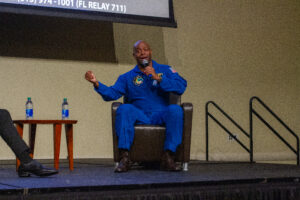Leland Melvin discusses ambition, diversity during Thursday’s ULS

Former NFL player and astronaut Leland Melvin grew up being inspired by abolitionist Harriet Tubman’s “watch me” attitude to dispel doubters, which he has carried through his career.
Melvin told the audience at Thursday’s University Lecture Series (ULS) to be ambitious. He encouraged a student with dreams of traveling to Mars to employ Tubman’s trailblazer attitude when striving to embark on the next frontier.
“As you go on your journey and someone says, ‘Alexa, you can’t go to Mars,’ [say] ‘Watch me,’” he said. “Have that mentality and have that perspective in anything that you do.”
Proving the doubters wrong requires grit that is unyielding to the pressures around someone trying to convince themself to give up, according to Melvin.
“You might have someone who just got all these records of accolades,” he said. “But if they don’t have that grit, they might give up versus someone else’s.”
The hourlong event was filled with advice from Melvin, inspired by his life, space and proving naysayers wrong.
Preregistration peaked at 142 attendees on BullsConnect, but only 64 checked in. Just before the discussion began, more students trickled into the Marshall Student Center Ballroom, building the attendance to about 100 people, according to ULS and special events graduate assistant Isabelle Starner.
The moderator, junior information security major Goziem Nwafor, broadly opened the Q&A-style conversation just after 7 p.m. by asking Melvin what it felt like to be an important and dichotomic figure in the Black community with his background as a former professional football player and astronaut.
“How do I feel? I feel great,” Melvin said.
He elevated the question by elaborating that his passions as an athlete and an academic didn’t box him into a fixed career path.
“Having both of those two things gives me the opportunity to share the story but also share the experience of ‘I can do something’ when people say, ‘No, you’re just a job,’” he said.
A simple question about Melvin’s feelings after being appointed the head of NASA’s education program generated a response about impact.
Reflecting on his father’s career in teaching, Melvin told a story where he felt his dad’s position enabled him to be a vehicle of second chances for those deserving in the community.
“My dad had a student who actually got in trouble and went to jail,” he said. “When he got out of jail, my dad was at the prison with a 1964 Chevy Impala.
“He said, ‘Look, I got you a job. You need this car to get to your job. Keep your nose clean and the car is yours.’ So that was an incentive for him to keep things going.”
His father’s willingness to support and motivate individuals willing to learn and change became Melvin’s benchmark as an educator and he said he strives to do the same.
In reference to Black Heritage Month, Nwafor asked Melvin if there should be greater representation of the Black community in space travel.
“No matter how you want to slice and dice it, people need to know that this is something that’s possible for them,” he said. “No matter what color, race, creed, culture, whatever. For the longest time, everyone wasn’t allowed to come to the table.”
For the final 15 minutes of the allotted hour, the floor opened for attendees to ask questions. The majority were about space science and the debate of returning to the moon versus expanding exploration to Mars.
Having been to space twice, Melvin enthusiastically described to a student how it physically felt to travel in space.
“You’re launching on your back then ‘3-2-1 liftoff,’” he said. “Your eyeballs are shaking so fast that you see lines on the screens.
“Two and a half minutes later, the solid rocket booster jets settle on things. Just smooth 3G through the chest making it hard to breathe. Then six and a half minutes later, everything that you dropped around you is now floating up to you.”
Melvin demonstrated the importance of taking everyone’s perspective into account when explaining how he has seen biases that resulted in tragedy while at NASA. He said everyone has inherent biases just by the nature of humanity, but it is important to be aware of them because they can severely impact others.
“An engineer said, ‘I think I saw something, we should take a look at the wing’ and the manager of the engineer said, ‘No, there’s no fuel. There’s no way an accident can happen,’” he said.
“I lost all my friends [because of a complication with the wing].”
NASA’s culture used to be hierarchical, where opinions were only as relevant as one’s status and rank in the organization, according to Melvin. Now, he said the institution takes every voice of concern seriously when it has the potential to protect those involved from danger.
Though Nwafor announced time was up right on the hour, Melvin convinced him to continue with more audience questions, which caused the event to run about 10 minutes past 8 p.m.
Before taking off, the researcher encouraged audience members to be ruthless in their endeavors and be supportive of those around them like Tubman.
“Always say to yourself, ‘Watch me. I got this and I can do it,’” he said. “Just don’t give up on people that’ve been on the journey.”







